PsyCap and Entrepreneurship: An Agricultural Perspective
VerifiedAdded on 2022/12/23
|25
|7961
|22
Report
AI Summary
This report investigates the significant impact of psychological capital (PsyCap) on entrepreneurship within the agricultural sector, primarily focusing on the context of Arabic countries. The study involved a sample of 516 respondents and utilized Partial Least Squares (PLS) to analyze the research model. The findings reveal that hope, self-efficacy, and resilience positively influence entrepreneurial intentions. The research highlights the importance of PsyCap in agricultural entrepreneurship, offering an integrated approach and emphasizing the role of information on horticultural expansion and its relation to PFP (presumably, Performance or Profitability Factors). The study identifies trust, certainty, flexibility, and ideology as intermediaries. This research contributes to the existing literature by exploring the application of psychological capital in agriculture. The report also highlights the role of various factors, including the importance of farmers' entrepreneurial spirit and how psychological capital can be a major driver of their success. The study also emphasizes that the current and future entrepreneurial activities are very important in order to ensure the future and well-being of the individuals and the society.
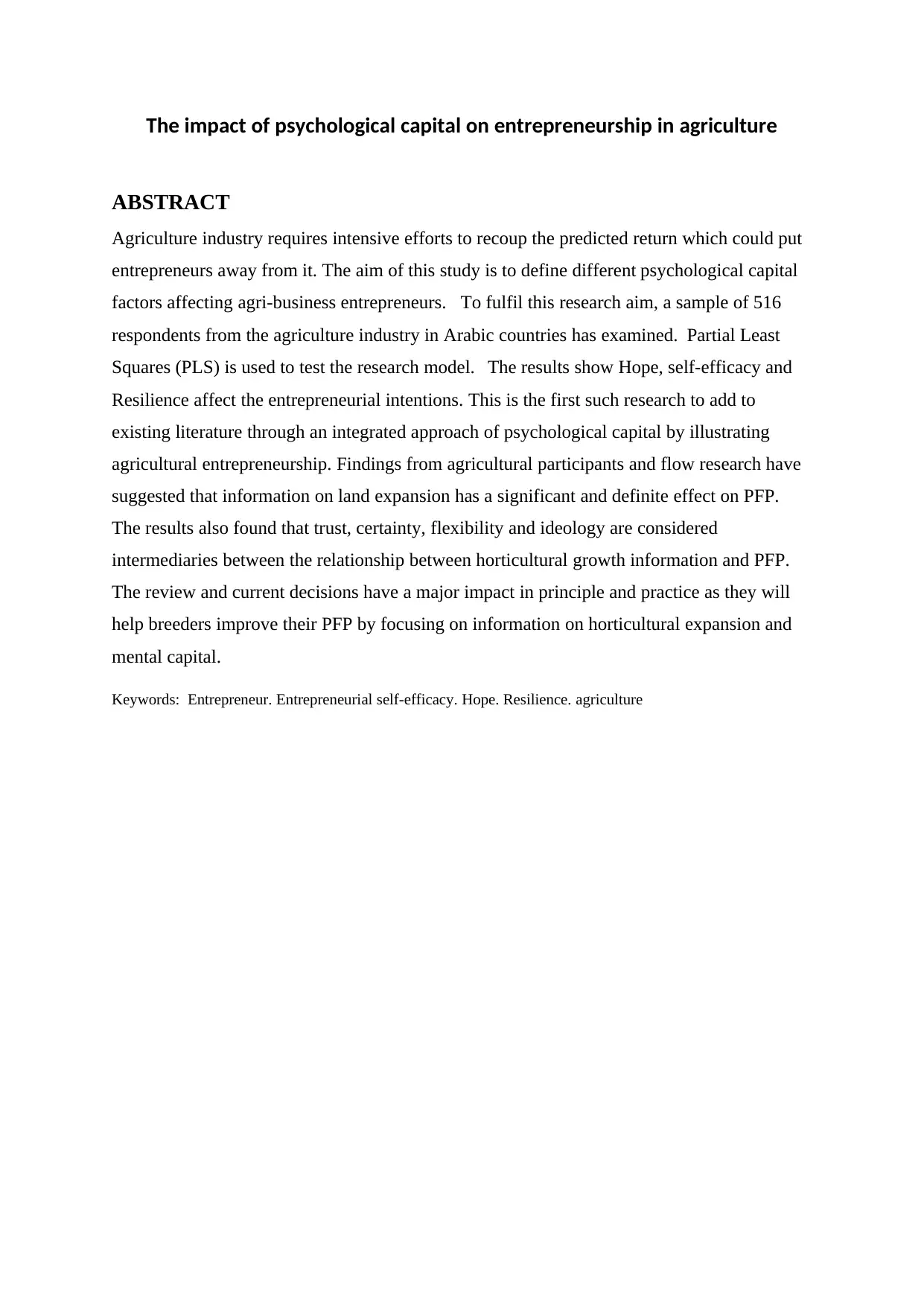
The impact of psychological capital on entrepreneurship in agriculture
ABSTRACT
Agriculture industry requires intensive efforts to recoup the predicted return which could put
entrepreneurs away from it. The aim of this study is to define different psychological capital
factors affecting agri-business entrepreneurs. To fulfil this research aim, a sample of 516
respondents from the agriculture industry in Arabic countries has examined. Partial Least
Squares (PLS) is used to test the research model. The results show Hope, self-efficacy and
Resilience affect the entrepreneurial intentions. This is the first such research to add to
existing literature through an integrated approach of psychological capital by illustrating
agricultural entrepreneurship. Findings from agricultural participants and flow research have
suggested that information on land expansion has a significant and definite effect on PFP.
The results also found that trust, certainty, flexibility and ideology are considered
intermediaries between the relationship between horticultural growth information and PFP.
The review and current decisions have a major impact in principle and practice as they will
help breeders improve their PFP by focusing on information on horticultural expansion and
mental capital.
Keywords: Entrepreneur. Entrepreneurial self-efficacy. Hope. Resilience. agriculture
ABSTRACT
Agriculture industry requires intensive efforts to recoup the predicted return which could put
entrepreneurs away from it. The aim of this study is to define different psychological capital
factors affecting agri-business entrepreneurs. To fulfil this research aim, a sample of 516
respondents from the agriculture industry in Arabic countries has examined. Partial Least
Squares (PLS) is used to test the research model. The results show Hope, self-efficacy and
Resilience affect the entrepreneurial intentions. This is the first such research to add to
existing literature through an integrated approach of psychological capital by illustrating
agricultural entrepreneurship. Findings from agricultural participants and flow research have
suggested that information on land expansion has a significant and definite effect on PFP.
The results also found that trust, certainty, flexibility and ideology are considered
intermediaries between the relationship between horticultural growth information and PFP.
The review and current decisions have a major impact in principle and practice as they will
help breeders improve their PFP by focusing on information on horticultural expansion and
mental capital.
Keywords: Entrepreneur. Entrepreneurial self-efficacy. Hope. Resilience. agriculture
Paraphrase This Document
Need a fresh take? Get an instant paraphrase of this document with our AI Paraphraser
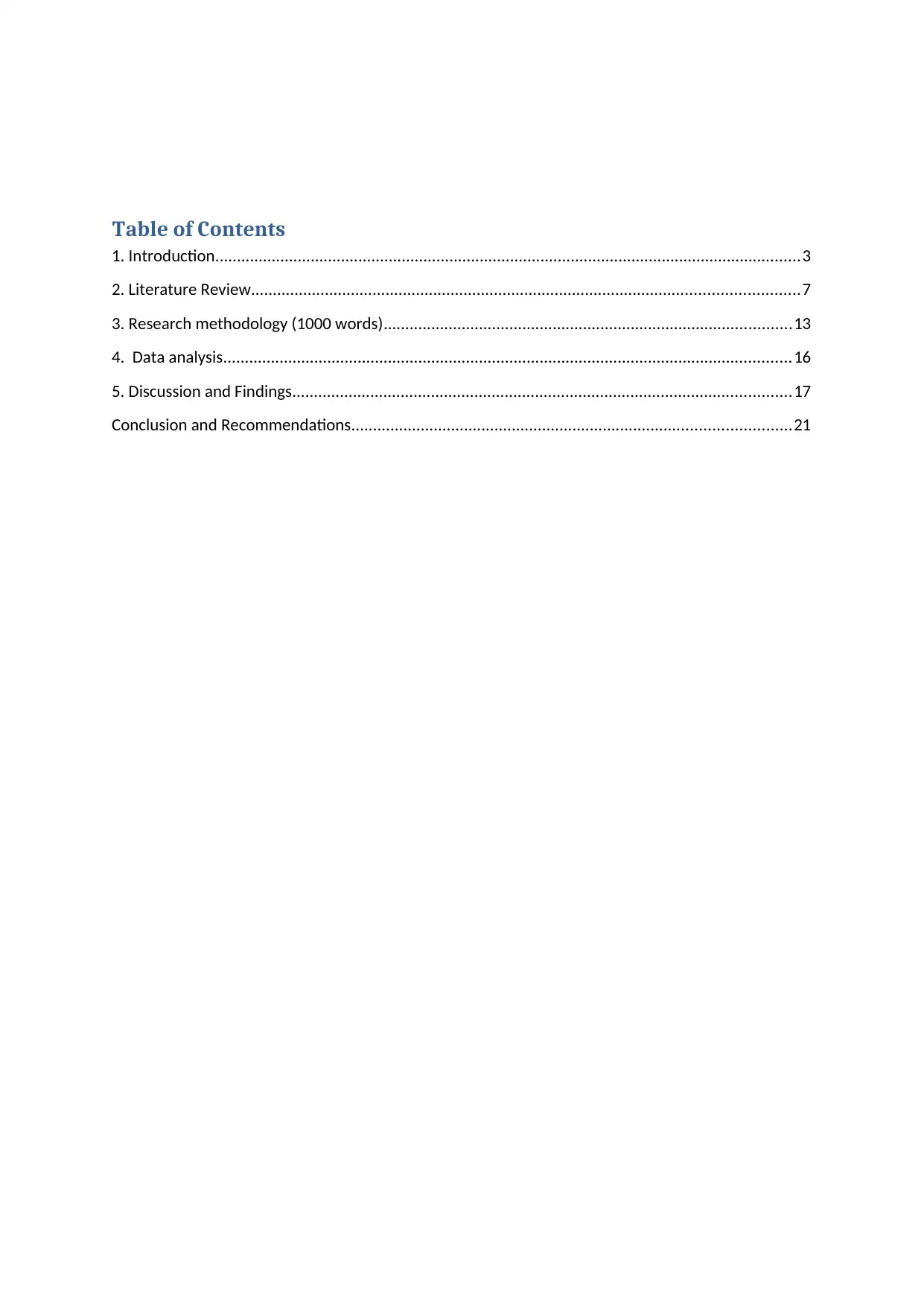
Table of Contents
1. Introduction.......................................................................................................................................3
2. Literature Review..............................................................................................................................7
3. Research methodology (1000 words)..............................................................................................13
4. Data analysis...................................................................................................................................16
5. Discussion and Findings...................................................................................................................17
Conclusion and Recommendations.....................................................................................................21
1. Introduction.......................................................................................................................................3
2. Literature Review..............................................................................................................................7
3. Research methodology (1000 words)..............................................................................................13
4. Data analysis...................................................................................................................................16
5. Discussion and Findings...................................................................................................................17
Conclusion and Recommendations.....................................................................................................21
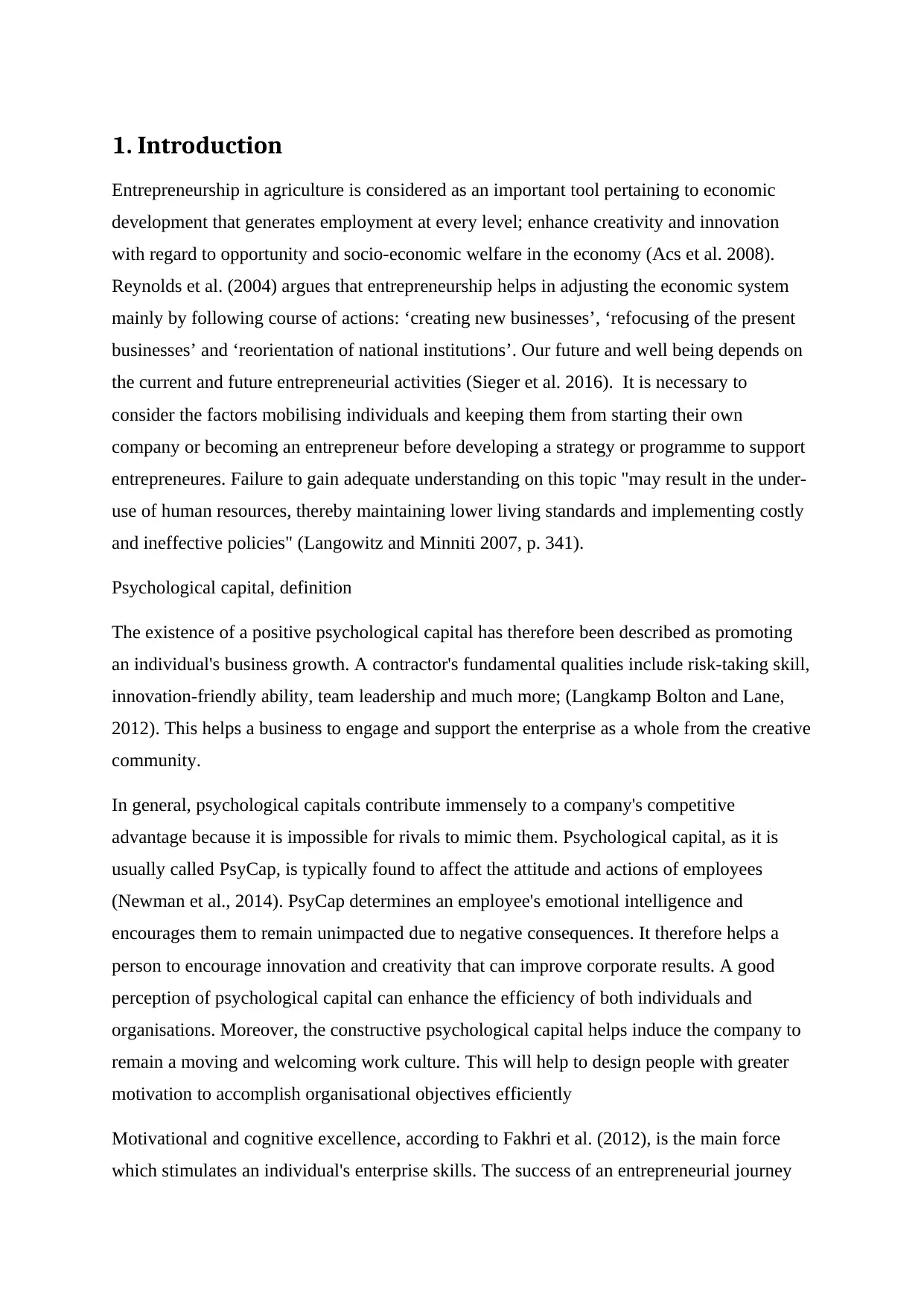
1. Introduction
Entrepreneurship in agriculture is considered as an important tool pertaining to economic
development that generates employment at every level; enhance creativity and innovation
with regard to opportunity and socio-economic welfare in the economy (Acs et al. 2008).
Reynolds et al. (2004) argues that entrepreneurship helps in adjusting the economic system
mainly by following course of actions: ‘creating new businesses’, ‘refocusing of the present
businesses’ and ‘reorientation of national institutions’. Our future and well being depends on
the current and future entrepreneurial activities (Sieger et al. 2016). It is necessary to
consider the factors mobilising individuals and keeping them from starting their own
company or becoming an entrepreneur before developing a strategy or programme to support
entrepreneures. Failure to gain adequate understanding on this topic "may result in the under-
use of human resources, thereby maintaining lower living standards and implementing costly
and ineffective policies" (Langowitz and Minniti 2007, p. 341).
Psychological capital, definition
The existence of a positive psychological capital has therefore been described as promoting
an individual's business growth. A contractor's fundamental qualities include risk-taking skill,
innovation-friendly ability, team leadership and much more; (Langkamp Bolton and Lane,
2012). This helps a business to engage and support the enterprise as a whole from the creative
community.
In general, psychological capitals contribute immensely to a company's competitive
advantage because it is impossible for rivals to mimic them. Psychological capital, as it is
usually called PsyCap, is typically found to affect the attitude and actions of employees
(Newman et al., 2014). PsyCap determines an employee's emotional intelligence and
encourages them to remain unimpacted due to negative consequences. It therefore helps a
person to encourage innovation and creativity that can improve corporate results. A good
perception of psychological capital can enhance the efficiency of both individuals and
organisations. Moreover, the constructive psychological capital helps induce the company to
remain a moving and welcoming work culture. This will help to design people with greater
motivation to accomplish organisational objectives efficiently
Motivational and cognitive excellence, according to Fakhri et al. (2012), is the main force
which stimulates an individual's enterprise skills. The success of an entrepreneurial journey
Entrepreneurship in agriculture is considered as an important tool pertaining to economic
development that generates employment at every level; enhance creativity and innovation
with regard to opportunity and socio-economic welfare in the economy (Acs et al. 2008).
Reynolds et al. (2004) argues that entrepreneurship helps in adjusting the economic system
mainly by following course of actions: ‘creating new businesses’, ‘refocusing of the present
businesses’ and ‘reorientation of national institutions’. Our future and well being depends on
the current and future entrepreneurial activities (Sieger et al. 2016). It is necessary to
consider the factors mobilising individuals and keeping them from starting their own
company or becoming an entrepreneur before developing a strategy or programme to support
entrepreneures. Failure to gain adequate understanding on this topic "may result in the under-
use of human resources, thereby maintaining lower living standards and implementing costly
and ineffective policies" (Langowitz and Minniti 2007, p. 341).
Psychological capital, definition
The existence of a positive psychological capital has therefore been described as promoting
an individual's business growth. A contractor's fundamental qualities include risk-taking skill,
innovation-friendly ability, team leadership and much more; (Langkamp Bolton and Lane,
2012). This helps a business to engage and support the enterprise as a whole from the creative
community.
In general, psychological capitals contribute immensely to a company's competitive
advantage because it is impossible for rivals to mimic them. Psychological capital, as it is
usually called PsyCap, is typically found to affect the attitude and actions of employees
(Newman et al., 2014). PsyCap determines an employee's emotional intelligence and
encourages them to remain unimpacted due to negative consequences. It therefore helps a
person to encourage innovation and creativity that can improve corporate results. A good
perception of psychological capital can enhance the efficiency of both individuals and
organisations. Moreover, the constructive psychological capital helps induce the company to
remain a moving and welcoming work culture. This will help to design people with greater
motivation to accomplish organisational objectives efficiently
Motivational and cognitive excellence, according to Fakhri et al. (2012), is the main force
which stimulates an individual's enterprise skills. The success of an entrepreneurial journey
⊘ This is a preview!⊘
Do you want full access?
Subscribe today to unlock all pages.

Trusted by 1+ million students worldwide
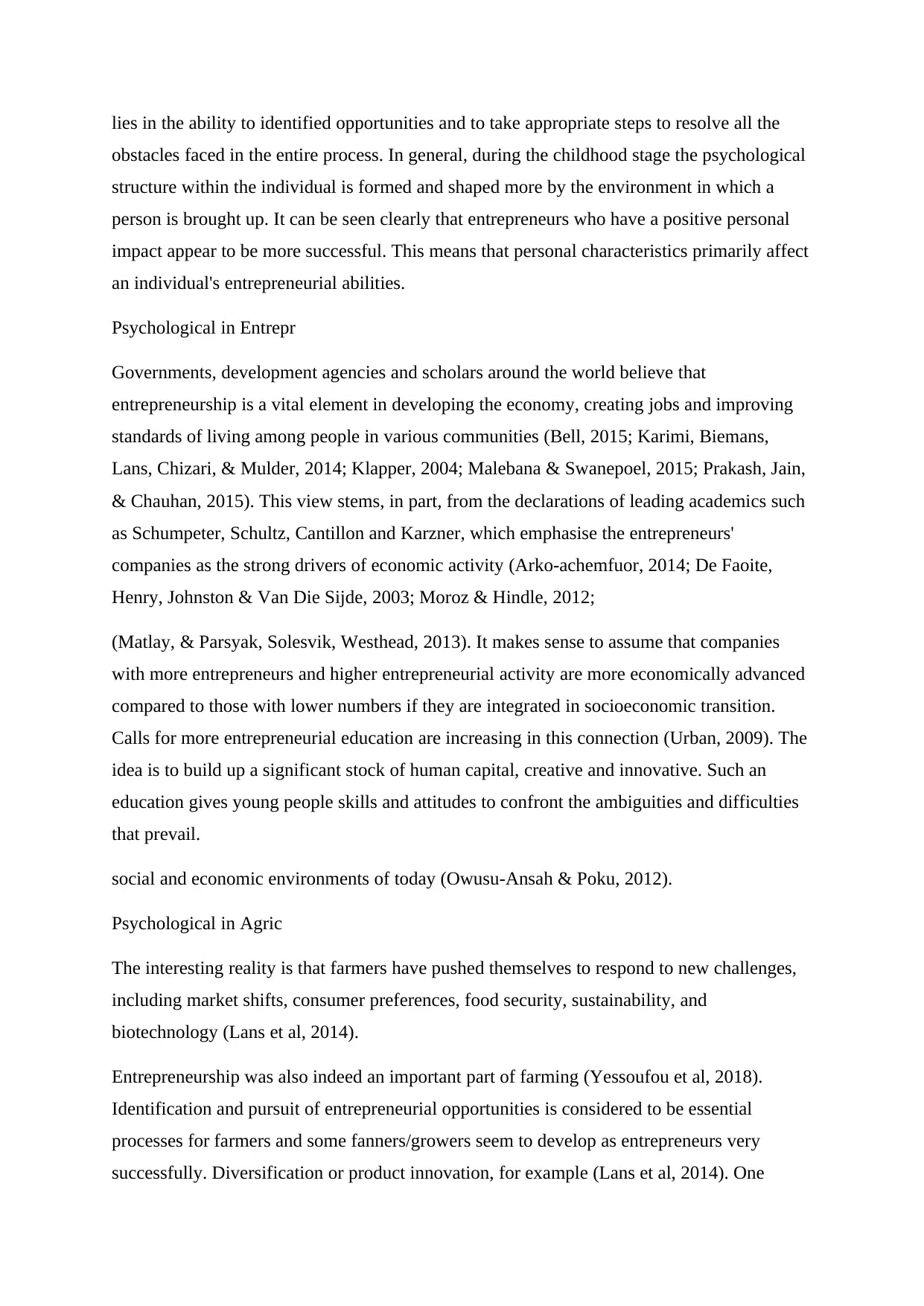
lies in the ability to identified opportunities and to take appropriate steps to resolve all the
obstacles faced in the entire process. In general, during the childhood stage the psychological
structure within the individual is formed and shaped more by the environment in which a
person is brought up. It can be seen clearly that entrepreneurs who have a positive personal
impact appear to be more successful. This means that personal characteristics primarily affect
an individual's entrepreneurial abilities.
Psychological in Entrepr
Governments, development agencies and scholars around the world believe that
entrepreneurship is a vital element in developing the economy, creating jobs and improving
standards of living among people in various communities (Bell, 2015; Karimi, Biemans,
Lans, Chizari, & Mulder, 2014; Klapper, 2004; Malebana & Swanepoel, 2015; Prakash, Jain,
& Chauhan, 2015). This view stems, in part, from the declarations of leading academics such
as Schumpeter, Schultz, Cantillon and Karzner, which emphasise the entrepreneurs'
companies as the strong drivers of economic activity (Arko-achemfuor, 2014; De Faoite,
Henry, Johnston & Van Die Sijde, 2003; Moroz & Hindle, 2012;
(Matlay, & Parsyak, Solesvik, Westhead, 2013). It makes sense to assume that companies
with more entrepreneurs and higher entrepreneurial activity are more economically advanced
compared to those with lower numbers if they are integrated in socioeconomic transition.
Calls for more entrepreneurial education are increasing in this connection (Urban, 2009). The
idea is to build up a significant stock of human capital, creative and innovative. Such an
education gives young people skills and attitudes to confront the ambiguities and difficulties
that prevail.
social and economic environments of today (Owusu-Ansah & Poku, 2012).
Psychological in Agric
The interesting reality is that farmers have pushed themselves to respond to new challenges,
including market shifts, consumer preferences, food security, sustainability, and
biotechnology (Lans et al, 2014).
Entrepreneurship was also indeed an important part of farming (Yessoufou et al, 2018).
Identification and pursuit of entrepreneurial opportunities is considered to be essential
processes for farmers and some fanners/growers seem to develop as entrepreneurs very
successfully. Diversification or product innovation, for example (Lans et al, 2014). One
obstacles faced in the entire process. In general, during the childhood stage the psychological
structure within the individual is formed and shaped more by the environment in which a
person is brought up. It can be seen clearly that entrepreneurs who have a positive personal
impact appear to be more successful. This means that personal characteristics primarily affect
an individual's entrepreneurial abilities.
Psychological in Entrepr
Governments, development agencies and scholars around the world believe that
entrepreneurship is a vital element in developing the economy, creating jobs and improving
standards of living among people in various communities (Bell, 2015; Karimi, Biemans,
Lans, Chizari, & Mulder, 2014; Klapper, 2004; Malebana & Swanepoel, 2015; Prakash, Jain,
& Chauhan, 2015). This view stems, in part, from the declarations of leading academics such
as Schumpeter, Schultz, Cantillon and Karzner, which emphasise the entrepreneurs'
companies as the strong drivers of economic activity (Arko-achemfuor, 2014; De Faoite,
Henry, Johnston & Van Die Sijde, 2003; Moroz & Hindle, 2012;
(Matlay, & Parsyak, Solesvik, Westhead, 2013). It makes sense to assume that companies
with more entrepreneurs and higher entrepreneurial activity are more economically advanced
compared to those with lower numbers if they are integrated in socioeconomic transition.
Calls for more entrepreneurial education are increasing in this connection (Urban, 2009). The
idea is to build up a significant stock of human capital, creative and innovative. Such an
education gives young people skills and attitudes to confront the ambiguities and difficulties
that prevail.
social and economic environments of today (Owusu-Ansah & Poku, 2012).
Psychological in Agric
The interesting reality is that farmers have pushed themselves to respond to new challenges,
including market shifts, consumer preferences, food security, sustainability, and
biotechnology (Lans et al, 2014).
Entrepreneurship was also indeed an important part of farming (Yessoufou et al, 2018).
Identification and pursuit of entrepreneurial opportunities is considered to be essential
processes for farmers and some fanners/growers seem to develop as entrepreneurs very
successfully. Diversification or product innovation, for example (Lans et al, 2014). One
Paraphrase This Document
Need a fresh take? Get an instant paraphrase of this document with our AI Paraphraser
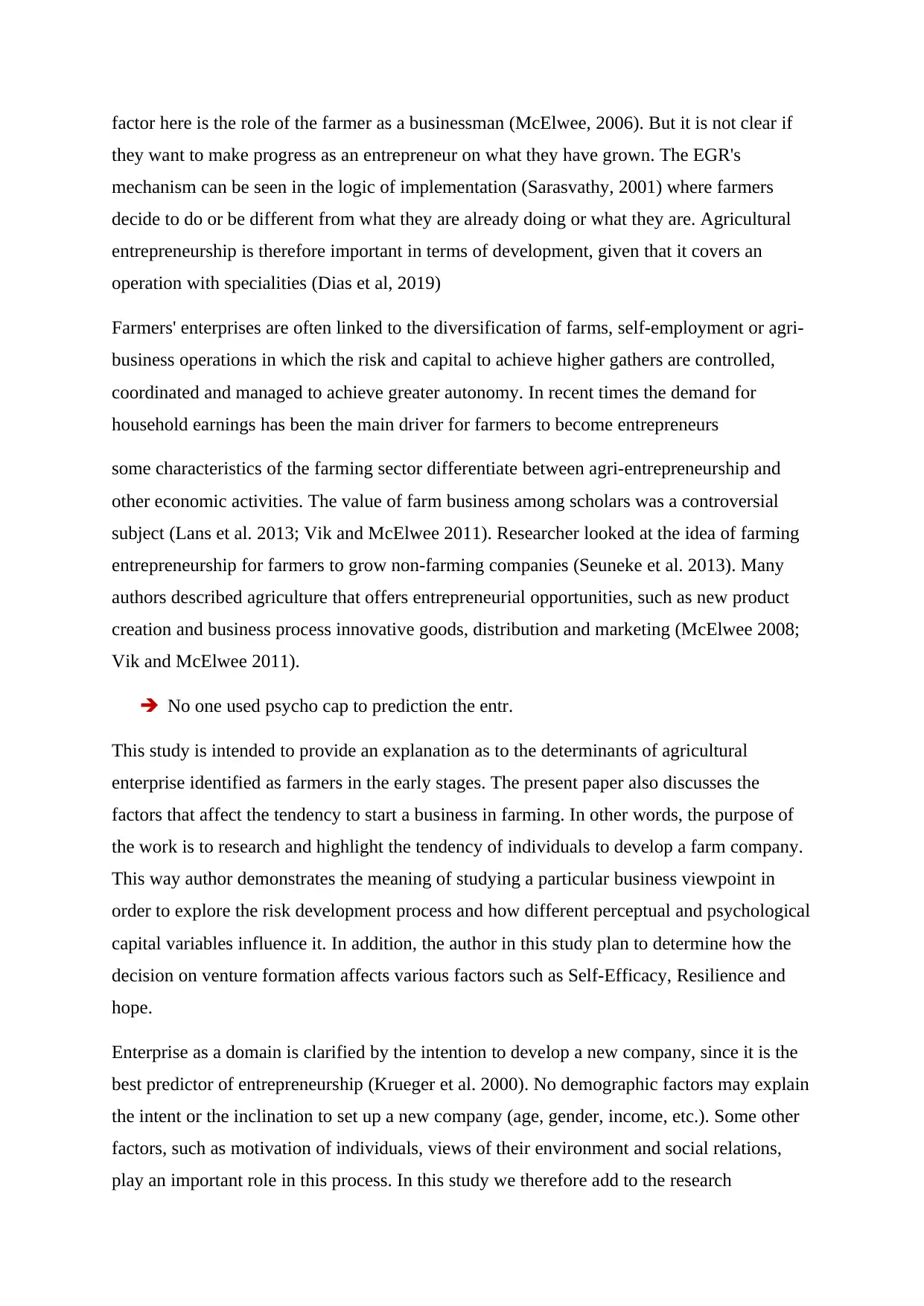
factor here is the role of the farmer as a businessman (McElwee, 2006). But it is not clear if
they want to make progress as an entrepreneur on what they have grown. The EGR's
mechanism can be seen in the logic of implementation (Sarasvathy, 2001) where farmers
decide to do or be different from what they are already doing or what they are. Agricultural
entrepreneurship is therefore important in terms of development, given that it covers an
operation with specialities (Dias et al, 2019)
Farmers' enterprises are often linked to the diversification of farms, self-employment or agri-
business operations in which the risk and capital to achieve higher gathers are controlled,
coordinated and managed to achieve greater autonomy. In recent times the demand for
household earnings has been the main driver for farmers to become entrepreneurs
some characteristics of the farming sector differentiate between agri-entrepreneurship and
other economic activities. The value of farm business among scholars was a controversial
subject (Lans et al. 2013; Vik and McElwee 2011). Researcher looked at the idea of farming
entrepreneurship for farmers to grow non-farming companies (Seuneke et al. 2013). Many
authors described agriculture that offers entrepreneurial opportunities, such as new product
creation and business process innovative goods, distribution and marketing (McElwee 2008;
Vik and McElwee 2011).
No one used psycho cap to prediction the entr.
This study is intended to provide an explanation as to the determinants of agricultural
enterprise identified as farmers in the early stages. The present paper also discusses the
factors that affect the tendency to start a business in farming. In other words, the purpose of
the work is to research and highlight the tendency of individuals to develop a farm company.
This way author demonstrates the meaning of studying a particular business viewpoint in
order to explore the risk development process and how different perceptual and psychological
capital variables influence it. In addition, the author in this study plan to determine how the
decision on venture formation affects various factors such as Self-Efficacy, Resilience and
hope.
Enterprise as a domain is clarified by the intention to develop a new company, since it is the
best predictor of entrepreneurship (Krueger et al. 2000). No demographic factors may explain
the intent or the inclination to set up a new company (age, gender, income, etc.). Some other
factors, such as motivation of individuals, views of their environment and social relations,
play an important role in this process. In this study we therefore add to the research
they want to make progress as an entrepreneur on what they have grown. The EGR's
mechanism can be seen in the logic of implementation (Sarasvathy, 2001) where farmers
decide to do or be different from what they are already doing or what they are. Agricultural
entrepreneurship is therefore important in terms of development, given that it covers an
operation with specialities (Dias et al, 2019)
Farmers' enterprises are often linked to the diversification of farms, self-employment or agri-
business operations in which the risk and capital to achieve higher gathers are controlled,
coordinated and managed to achieve greater autonomy. In recent times the demand for
household earnings has been the main driver for farmers to become entrepreneurs
some characteristics of the farming sector differentiate between agri-entrepreneurship and
other economic activities. The value of farm business among scholars was a controversial
subject (Lans et al. 2013; Vik and McElwee 2011). Researcher looked at the idea of farming
entrepreneurship for farmers to grow non-farming companies (Seuneke et al. 2013). Many
authors described agriculture that offers entrepreneurial opportunities, such as new product
creation and business process innovative goods, distribution and marketing (McElwee 2008;
Vik and McElwee 2011).
No one used psycho cap to prediction the entr.
This study is intended to provide an explanation as to the determinants of agricultural
enterprise identified as farmers in the early stages. The present paper also discusses the
factors that affect the tendency to start a business in farming. In other words, the purpose of
the work is to research and highlight the tendency of individuals to develop a farm company.
This way author demonstrates the meaning of studying a particular business viewpoint in
order to explore the risk development process and how different perceptual and psychological
capital variables influence it. In addition, the author in this study plan to determine how the
decision on venture formation affects various factors such as Self-Efficacy, Resilience and
hope.
Enterprise as a domain is clarified by the intention to develop a new company, since it is the
best predictor of entrepreneurship (Krueger et al. 2000). No demographic factors may explain
the intent or the inclination to set up a new company (age, gender, income, etc.). Some other
factors, such as motivation of individuals, views of their environment and social relations,
play an important role in this process. In this study we therefore add to the research
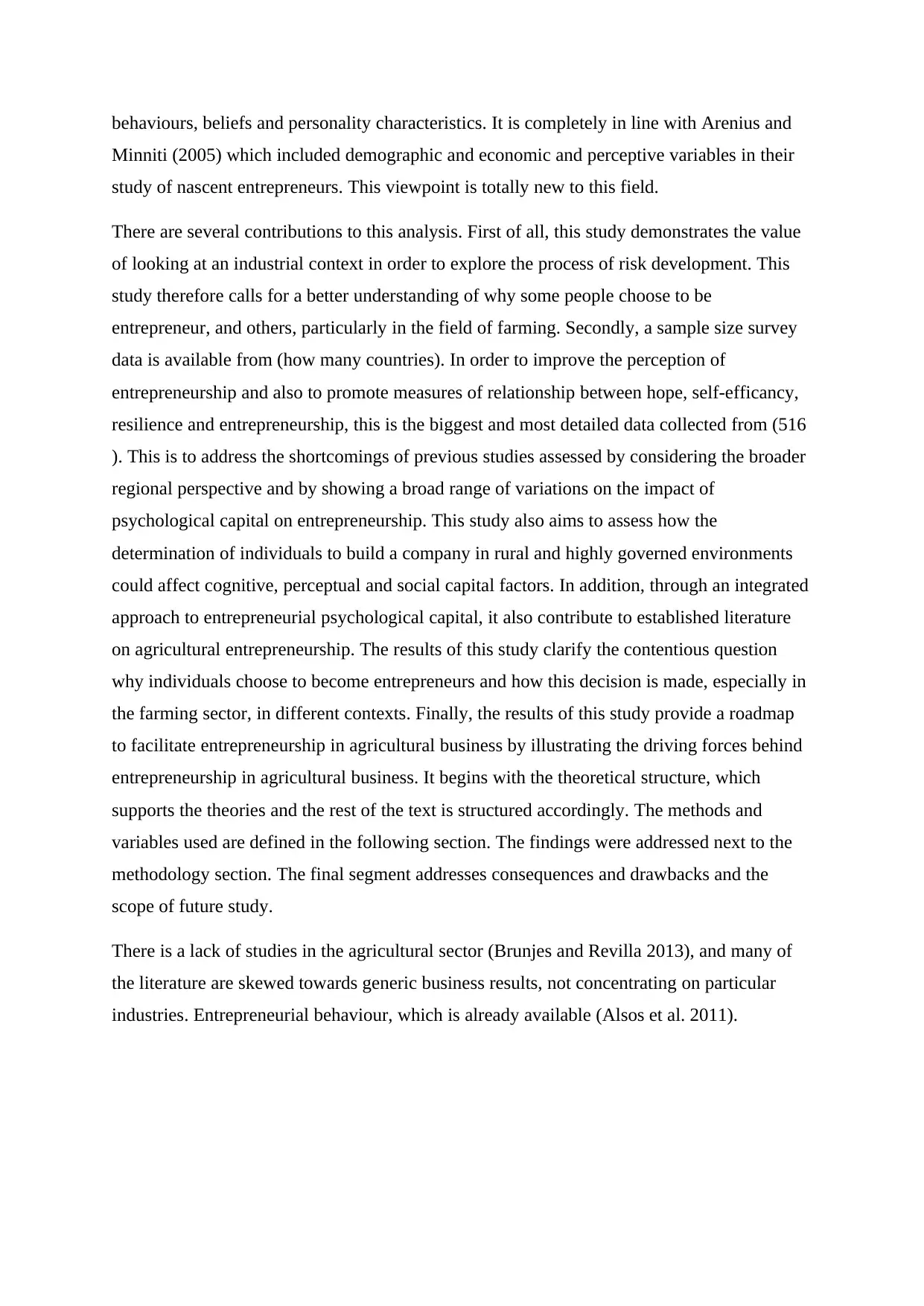
behaviours, beliefs and personality characteristics. It is completely in line with Arenius and
Minniti (2005) which included demographic and economic and perceptive variables in their
study of nascent entrepreneurs. This viewpoint is totally new to this field.
There are several contributions to this analysis. First of all, this study demonstrates the value
of looking at an industrial context in order to explore the process of risk development. This
study therefore calls for a better understanding of why some people choose to be
entrepreneur, and others, particularly in the field of farming. Secondly, a sample size survey
data is available from (how many countries). In order to improve the perception of
entrepreneurship and also to promote measures of relationship between hope, self-efficancy,
resilience and entrepreneurship, this is the biggest and most detailed data collected from (516
). This is to address the shortcomings of previous studies assessed by considering the broader
regional perspective and by showing a broad range of variations on the impact of
psychological capital on entrepreneurship. This study also aims to assess how the
determination of individuals to build a company in rural and highly governed environments
could affect cognitive, perceptual and social capital factors. In addition, through an integrated
approach to entrepreneurial psychological capital, it also contribute to established literature
on agricultural entrepreneurship. The results of this study clarify the contentious question
why individuals choose to become entrepreneurs and how this decision is made, especially in
the farming sector, in different contexts. Finally, the results of this study provide a roadmap
to facilitate entrepreneurship in agricultural business by illustrating the driving forces behind
entrepreneurship in agricultural business. It begins with the theoretical structure, which
supports the theories and the rest of the text is structured accordingly. The methods and
variables used are defined in the following section. The findings were addressed next to the
methodology section. The final segment addresses consequences and drawbacks and the
scope of future study.
There is a lack of studies in the agricultural sector (Brunjes and Revilla 2013), and many of
the literature are skewed towards generic business results, not concentrating on particular
industries. Entrepreneurial behaviour, which is already available (Alsos et al. 2011).
Minniti (2005) which included demographic and economic and perceptive variables in their
study of nascent entrepreneurs. This viewpoint is totally new to this field.
There are several contributions to this analysis. First of all, this study demonstrates the value
of looking at an industrial context in order to explore the process of risk development. This
study therefore calls for a better understanding of why some people choose to be
entrepreneur, and others, particularly in the field of farming. Secondly, a sample size survey
data is available from (how many countries). In order to improve the perception of
entrepreneurship and also to promote measures of relationship between hope, self-efficancy,
resilience and entrepreneurship, this is the biggest and most detailed data collected from (516
). This is to address the shortcomings of previous studies assessed by considering the broader
regional perspective and by showing a broad range of variations on the impact of
psychological capital on entrepreneurship. This study also aims to assess how the
determination of individuals to build a company in rural and highly governed environments
could affect cognitive, perceptual and social capital factors. In addition, through an integrated
approach to entrepreneurial psychological capital, it also contribute to established literature
on agricultural entrepreneurship. The results of this study clarify the contentious question
why individuals choose to become entrepreneurs and how this decision is made, especially in
the farming sector, in different contexts. Finally, the results of this study provide a roadmap
to facilitate entrepreneurship in agricultural business by illustrating the driving forces behind
entrepreneurship in agricultural business. It begins with the theoretical structure, which
supports the theories and the rest of the text is structured accordingly. The methods and
variables used are defined in the following section. The findings were addressed next to the
methodology section. The final segment addresses consequences and drawbacks and the
scope of future study.
There is a lack of studies in the agricultural sector (Brunjes and Revilla 2013), and many of
the literature are skewed towards generic business results, not concentrating on particular
industries. Entrepreneurial behaviour, which is already available (Alsos et al. 2011).
⊘ This is a preview!⊘
Do you want full access?
Subscribe today to unlock all pages.

Trusted by 1+ million students worldwide
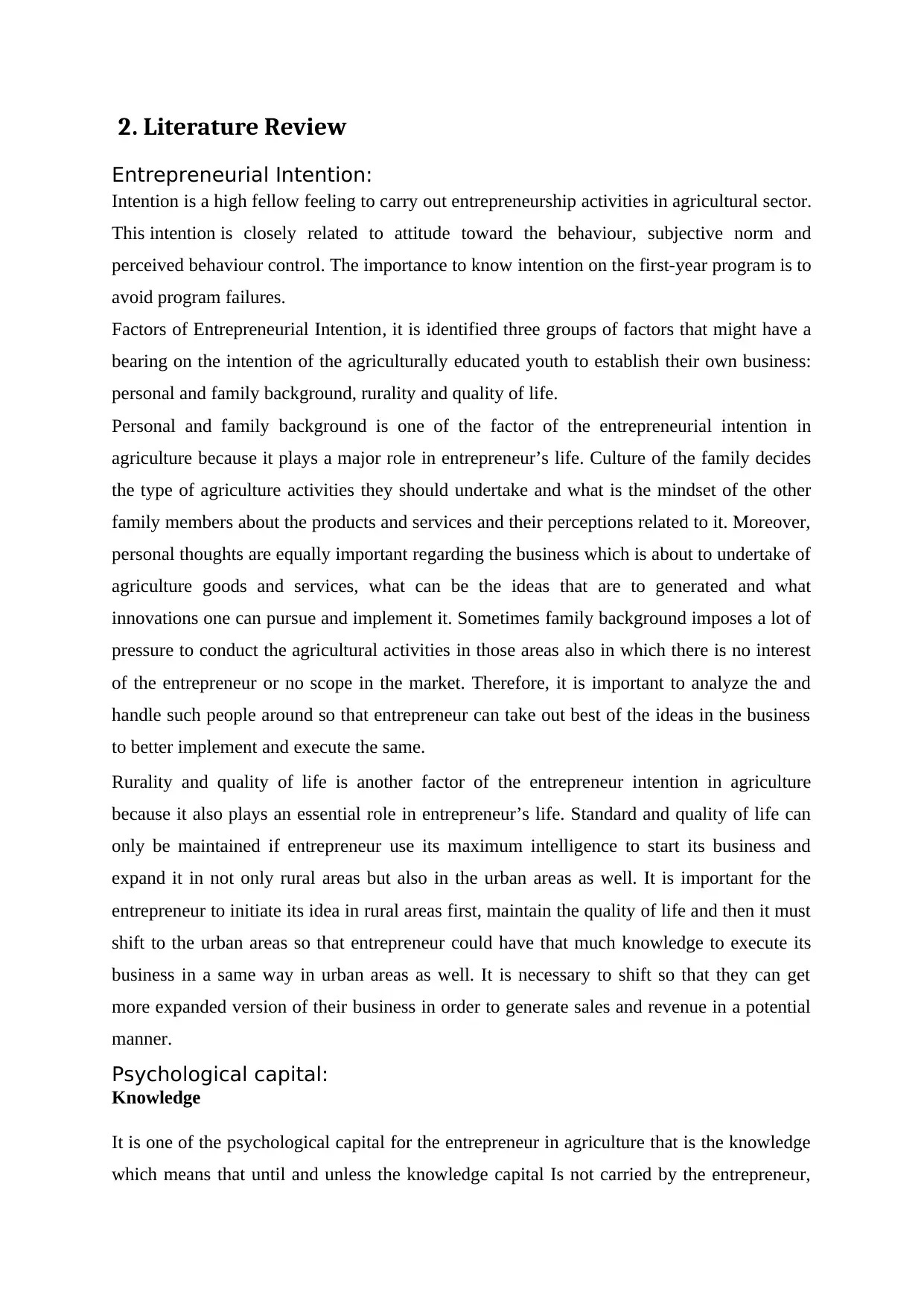
2. Literature Review
Entrepreneurial Intention:
Intention is a high fellow feeling to carry out entrepreneurship activities in agricultural sector.
This intention is closely related to attitude toward the behaviour, subjective norm and
perceived behaviour control. The importance to know intention on the first-year program is to
avoid program failures.
Factors of Entrepreneurial Intention, it is identified three groups of factors that might have a
bearing on the intention of the agriculturally educated youth to establish their own business:
personal and family background, rurality and quality of life.
Personal and family background is one of the factor of the entrepreneurial intention in
agriculture because it plays a major role in entrepreneur’s life. Culture of the family decides
the type of agriculture activities they should undertake and what is the mindset of the other
family members about the products and services and their perceptions related to it. Moreover,
personal thoughts are equally important regarding the business which is about to undertake of
agriculture goods and services, what can be the ideas that are to generated and what
innovations one can pursue and implement it. Sometimes family background imposes a lot of
pressure to conduct the agricultural activities in those areas also in which there is no interest
of the entrepreneur or no scope in the market. Therefore, it is important to analyze the and
handle such people around so that entrepreneur can take out best of the ideas in the business
to better implement and execute the same.
Rurality and quality of life is another factor of the entrepreneur intention in agriculture
because it also plays an essential role in entrepreneur’s life. Standard and quality of life can
only be maintained if entrepreneur use its maximum intelligence to start its business and
expand it in not only rural areas but also in the urban areas as well. It is important for the
entrepreneur to initiate its idea in rural areas first, maintain the quality of life and then it must
shift to the urban areas so that entrepreneur could have that much knowledge to execute its
business in a same way in urban areas as well. It is necessary to shift so that they can get
more expanded version of their business in order to generate sales and revenue in a potential
manner.
Psychological capital:
Knowledge
It is one of the psychological capital for the entrepreneur in agriculture that is the knowledge
which means that until and unless the knowledge capital Is not carried by the entrepreneur,
Entrepreneurial Intention:
Intention is a high fellow feeling to carry out entrepreneurship activities in agricultural sector.
This intention is closely related to attitude toward the behaviour, subjective norm and
perceived behaviour control. The importance to know intention on the first-year program is to
avoid program failures.
Factors of Entrepreneurial Intention, it is identified three groups of factors that might have a
bearing on the intention of the agriculturally educated youth to establish their own business:
personal and family background, rurality and quality of life.
Personal and family background is one of the factor of the entrepreneurial intention in
agriculture because it plays a major role in entrepreneur’s life. Culture of the family decides
the type of agriculture activities they should undertake and what is the mindset of the other
family members about the products and services and their perceptions related to it. Moreover,
personal thoughts are equally important regarding the business which is about to undertake of
agriculture goods and services, what can be the ideas that are to generated and what
innovations one can pursue and implement it. Sometimes family background imposes a lot of
pressure to conduct the agricultural activities in those areas also in which there is no interest
of the entrepreneur or no scope in the market. Therefore, it is important to analyze the and
handle such people around so that entrepreneur can take out best of the ideas in the business
to better implement and execute the same.
Rurality and quality of life is another factor of the entrepreneur intention in agriculture
because it also plays an essential role in entrepreneur’s life. Standard and quality of life can
only be maintained if entrepreneur use its maximum intelligence to start its business and
expand it in not only rural areas but also in the urban areas as well. It is important for the
entrepreneur to initiate its idea in rural areas first, maintain the quality of life and then it must
shift to the urban areas so that entrepreneur could have that much knowledge to execute its
business in a same way in urban areas as well. It is necessary to shift so that they can get
more expanded version of their business in order to generate sales and revenue in a potential
manner.
Psychological capital:
Knowledge
It is one of the psychological capital for the entrepreneur in agriculture that is the knowledge
which means that until and unless the knowledge capital Is not carried by the entrepreneur,
Paraphrase This Document
Need a fresh take? Get an instant paraphrase of this document with our AI Paraphraser
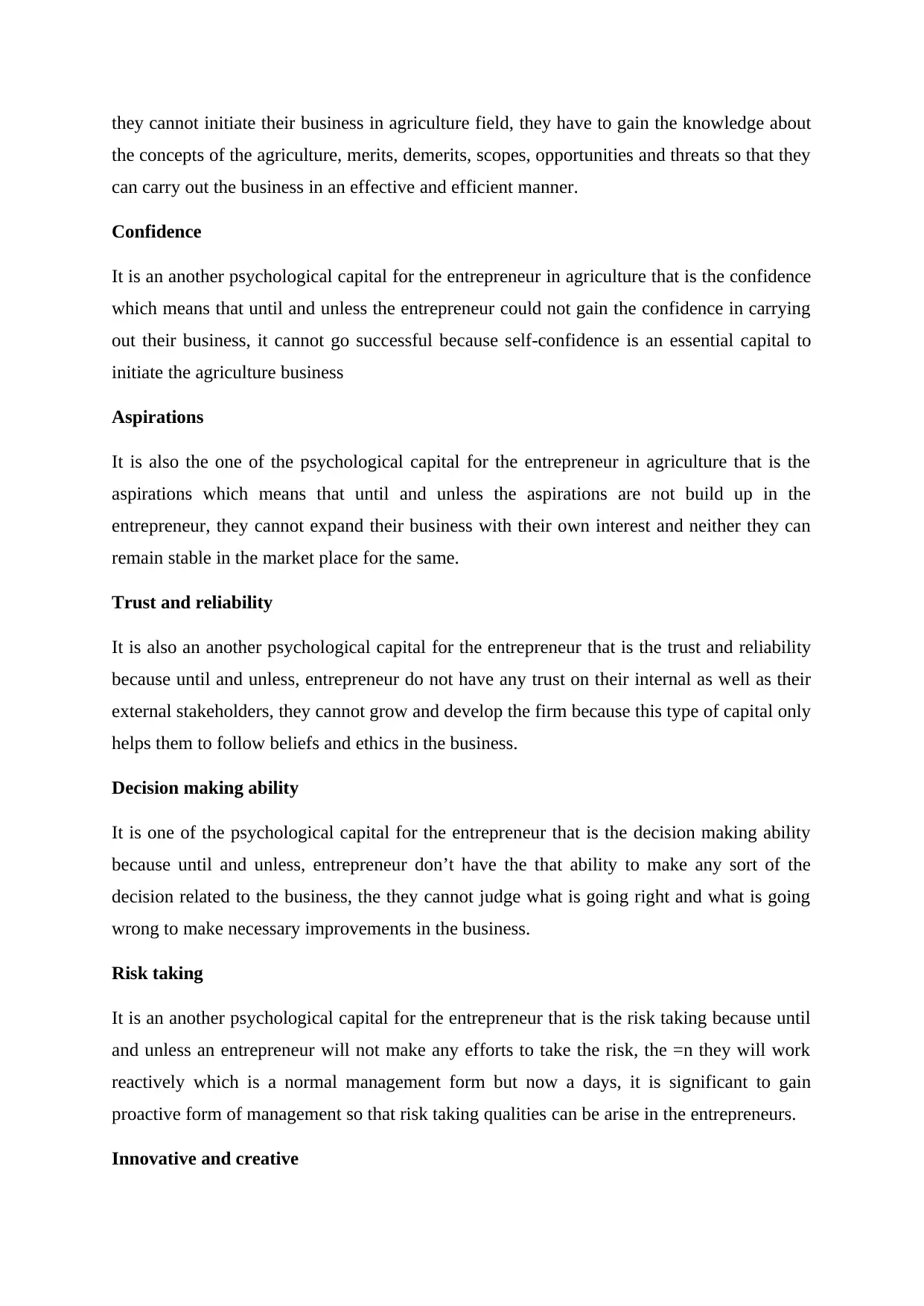
they cannot initiate their business in agriculture field, they have to gain the knowledge about
the concepts of the agriculture, merits, demerits, scopes, opportunities and threats so that they
can carry out the business in an effective and efficient manner.
Confidence
It is an another psychological capital for the entrepreneur in agriculture that is the confidence
which means that until and unless the entrepreneur could not gain the confidence in carrying
out their business, it cannot go successful because self-confidence is an essential capital to
initiate the agriculture business
Aspirations
It is also the one of the psychological capital for the entrepreneur in agriculture that is the
aspirations which means that until and unless the aspirations are not build up in the
entrepreneur, they cannot expand their business with their own interest and neither they can
remain stable in the market place for the same.
Trust and reliability
It is also an another psychological capital for the entrepreneur that is the trust and reliability
because until and unless, entrepreneur do not have any trust on their internal as well as their
external stakeholders, they cannot grow and develop the firm because this type of capital only
helps them to follow beliefs and ethics in the business.
Decision making ability
It is one of the psychological capital for the entrepreneur that is the decision making ability
because until and unless, entrepreneur don’t have the that ability to make any sort of the
decision related to the business, the they cannot judge what is going right and what is going
wrong to make necessary improvements in the business.
Risk taking
It is an another psychological capital for the entrepreneur that is the risk taking because until
and unless an entrepreneur will not make any efforts to take the risk, the =n they will work
reactively which is a normal management form but now a days, it is significant to gain
proactive form of management so that risk taking qualities can be arise in the entrepreneurs.
Innovative and creative
the concepts of the agriculture, merits, demerits, scopes, opportunities and threats so that they
can carry out the business in an effective and efficient manner.
Confidence
It is an another psychological capital for the entrepreneur in agriculture that is the confidence
which means that until and unless the entrepreneur could not gain the confidence in carrying
out their business, it cannot go successful because self-confidence is an essential capital to
initiate the agriculture business
Aspirations
It is also the one of the psychological capital for the entrepreneur in agriculture that is the
aspirations which means that until and unless the aspirations are not build up in the
entrepreneur, they cannot expand their business with their own interest and neither they can
remain stable in the market place for the same.
Trust and reliability
It is also an another psychological capital for the entrepreneur that is the trust and reliability
because until and unless, entrepreneur do not have any trust on their internal as well as their
external stakeholders, they cannot grow and develop the firm because this type of capital only
helps them to follow beliefs and ethics in the business.
Decision making ability
It is one of the psychological capital for the entrepreneur that is the decision making ability
because until and unless, entrepreneur don’t have the that ability to make any sort of the
decision related to the business, the they cannot judge what is going right and what is going
wrong to make necessary improvements in the business.
Risk taking
It is an another psychological capital for the entrepreneur that is the risk taking because until
and unless an entrepreneur will not make any efforts to take the risk, the =n they will work
reactively which is a normal management form but now a days, it is significant to gain
proactive form of management so that risk taking qualities can be arise in the entrepreneurs.
Innovative and creative
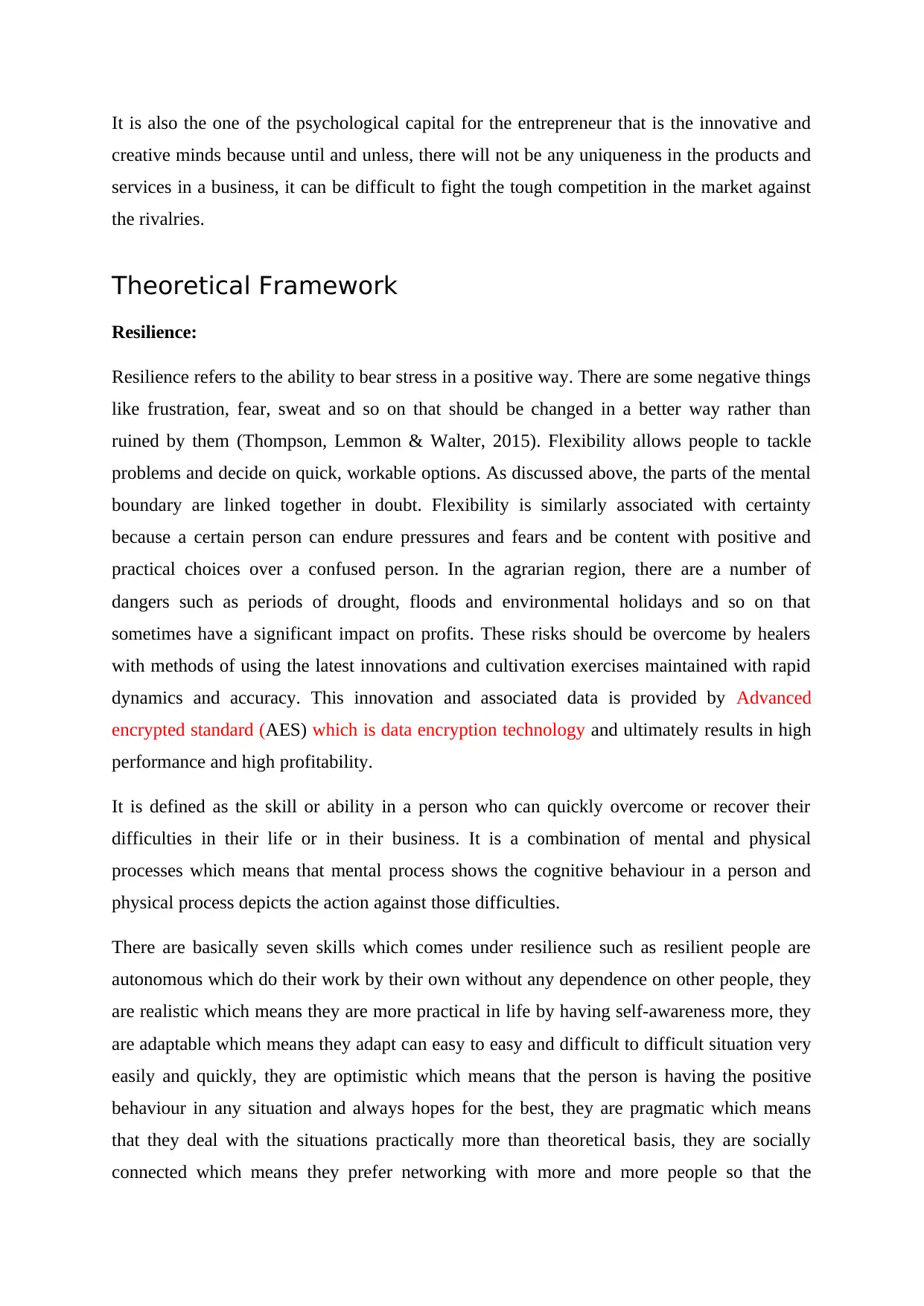
It is also the one of the psychological capital for the entrepreneur that is the innovative and
creative minds because until and unless, there will not be any uniqueness in the products and
services in a business, it can be difficult to fight the tough competition in the market against
the rivalries.
Theoretical Framework
Resilience:
Resilience refers to the ability to bear stress in a positive way. There are some negative things
like frustration, fear, sweat and so on that should be changed in a better way rather than
ruined by them (Thompson, Lemmon & Walter, 2015). Flexibility allows people to tackle
problems and decide on quick, workable options. As discussed above, the parts of the mental
boundary are linked together in doubt. Flexibility is similarly associated with certainty
because a certain person can endure pressures and fears and be content with positive and
practical choices over a confused person. In the agrarian region, there are a number of
dangers such as periods of drought, floods and environmental holidays and so on that
sometimes have a significant impact on profits. These risks should be overcome by healers
with methods of using the latest innovations and cultivation exercises maintained with rapid
dynamics and accuracy. This innovation and associated data is provided by Advanced
encrypted standard (AES) which is data encryption technology and ultimately results in high
performance and high profitability.
It is defined as the skill or ability in a person who can quickly overcome or recover their
difficulties in their life or in their business. It is a combination of mental and physical
processes which means that mental process shows the cognitive behaviour in a person and
physical process depicts the action against those difficulties.
There are basically seven skills which comes under resilience such as resilient people are
autonomous which do their work by their own without any dependence on other people, they
are realistic which means they are more practical in life by having self-awareness more, they
are adaptable which means they adapt can easy to easy and difficult to difficult situation very
easily and quickly, they are optimistic which means that the person is having the positive
behaviour in any situation and always hopes for the best, they are pragmatic which means
that they deal with the situations practically more than theoretical basis, they are socially
connected which means they prefer networking with more and more people so that the
creative minds because until and unless, there will not be any uniqueness in the products and
services in a business, it can be difficult to fight the tough competition in the market against
the rivalries.
Theoretical Framework
Resilience:
Resilience refers to the ability to bear stress in a positive way. There are some negative things
like frustration, fear, sweat and so on that should be changed in a better way rather than
ruined by them (Thompson, Lemmon & Walter, 2015). Flexibility allows people to tackle
problems and decide on quick, workable options. As discussed above, the parts of the mental
boundary are linked together in doubt. Flexibility is similarly associated with certainty
because a certain person can endure pressures and fears and be content with positive and
practical choices over a confused person. In the agrarian region, there are a number of
dangers such as periods of drought, floods and environmental holidays and so on that
sometimes have a significant impact on profits. These risks should be overcome by healers
with methods of using the latest innovations and cultivation exercises maintained with rapid
dynamics and accuracy. This innovation and associated data is provided by Advanced
encrypted standard (AES) which is data encryption technology and ultimately results in high
performance and high profitability.
It is defined as the skill or ability in a person who can quickly overcome or recover their
difficulties in their life or in their business. It is a combination of mental and physical
processes which means that mental process shows the cognitive behaviour in a person and
physical process depicts the action against those difficulties.
There are basically seven skills which comes under resilience such as resilient people are
autonomous which do their work by their own without any dependence on other people, they
are realistic which means they are more practical in life by having self-awareness more, they
are adaptable which means they adapt can easy to easy and difficult to difficult situation very
easily and quickly, they are optimistic which means that the person is having the positive
behaviour in any situation and always hopes for the best, they are pragmatic which means
that they deal with the situations practically more than theoretical basis, they are socially
connected which means they prefer networking with more and more people so that the
⊘ This is a preview!⊘
Do you want full access?
Subscribe today to unlock all pages.

Trusted by 1+ million students worldwide
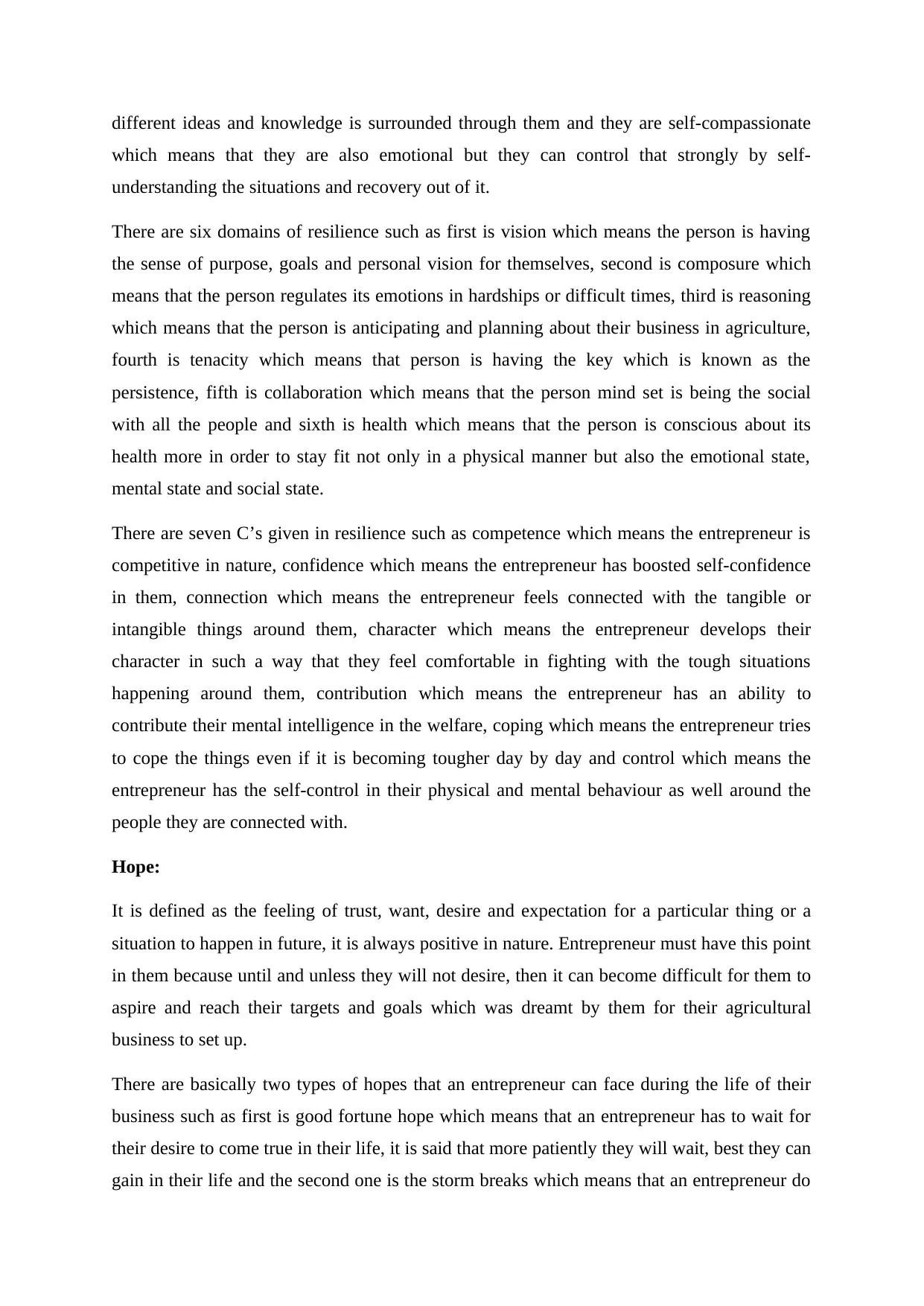
different ideas and knowledge is surrounded through them and they are self-compassionate
which means that they are also emotional but they can control that strongly by self-
understanding the situations and recovery out of it.
There are six domains of resilience such as first is vision which means the person is having
the sense of purpose, goals and personal vision for themselves, second is composure which
means that the person regulates its emotions in hardships or difficult times, third is reasoning
which means that the person is anticipating and planning about their business in agriculture,
fourth is tenacity which means that person is having the key which is known as the
persistence, fifth is collaboration which means that the person mind set is being the social
with all the people and sixth is health which means that the person is conscious about its
health more in order to stay fit not only in a physical manner but also the emotional state,
mental state and social state.
There are seven C’s given in resilience such as competence which means the entrepreneur is
competitive in nature, confidence which means the entrepreneur has boosted self-confidence
in them, connection which means the entrepreneur feels connected with the tangible or
intangible things around them, character which means the entrepreneur develops their
character in such a way that they feel comfortable in fighting with the tough situations
happening around them, contribution which means the entrepreneur has an ability to
contribute their mental intelligence in the welfare, coping which means the entrepreneur tries
to cope the things even if it is becoming tougher day by day and control which means the
entrepreneur has the self-control in their physical and mental behaviour as well around the
people they are connected with.
Hope:
It is defined as the feeling of trust, want, desire and expectation for a particular thing or a
situation to happen in future, it is always positive in nature. Entrepreneur must have this point
in them because until and unless they will not desire, then it can become difficult for them to
aspire and reach their targets and goals which was dreamt by them for their agricultural
business to set up.
There are basically two types of hopes that an entrepreneur can face during the life of their
business such as first is good fortune hope which means that an entrepreneur has to wait for
their desire to come true in their life, it is said that more patiently they will wait, best they can
gain in their life and the second one is the storm breaks which means that an entrepreneur do
which means that they are also emotional but they can control that strongly by self-
understanding the situations and recovery out of it.
There are six domains of resilience such as first is vision which means the person is having
the sense of purpose, goals and personal vision for themselves, second is composure which
means that the person regulates its emotions in hardships or difficult times, third is reasoning
which means that the person is anticipating and planning about their business in agriculture,
fourth is tenacity which means that person is having the key which is known as the
persistence, fifth is collaboration which means that the person mind set is being the social
with all the people and sixth is health which means that the person is conscious about its
health more in order to stay fit not only in a physical manner but also the emotional state,
mental state and social state.
There are seven C’s given in resilience such as competence which means the entrepreneur is
competitive in nature, confidence which means the entrepreneur has boosted self-confidence
in them, connection which means the entrepreneur feels connected with the tangible or
intangible things around them, character which means the entrepreneur develops their
character in such a way that they feel comfortable in fighting with the tough situations
happening around them, contribution which means the entrepreneur has an ability to
contribute their mental intelligence in the welfare, coping which means the entrepreneur tries
to cope the things even if it is becoming tougher day by day and control which means the
entrepreneur has the self-control in their physical and mental behaviour as well around the
people they are connected with.
Hope:
It is defined as the feeling of trust, want, desire and expectation for a particular thing or a
situation to happen in future, it is always positive in nature. Entrepreneur must have this point
in them because until and unless they will not desire, then it can become difficult for them to
aspire and reach their targets and goals which was dreamt by them for their agricultural
business to set up.
There are basically two types of hopes that an entrepreneur can face during the life of their
business such as first is good fortune hope which means that an entrepreneur has to wait for
their desire to come true in their life, it is said that more patiently they will wait, best they can
gain in their life and the second one is the storm breaks which means that an entrepreneur do
Paraphrase This Document
Need a fresh take? Get an instant paraphrase of this document with our AI Paraphraser
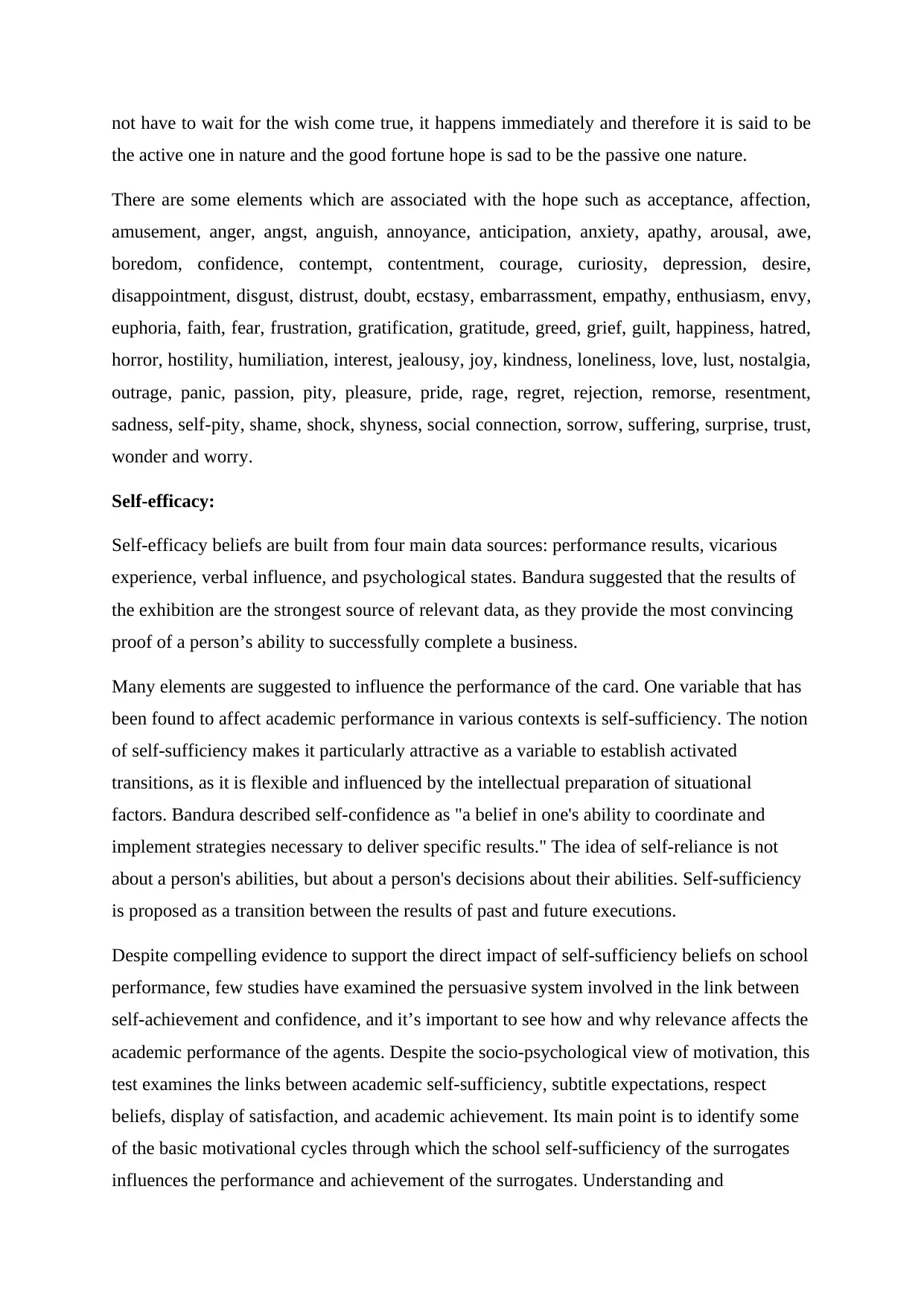
not have to wait for the wish come true, it happens immediately and therefore it is said to be
the active one in nature and the good fortune hope is sad to be the passive one nature.
There are some elements which are associated with the hope such as acceptance, affection,
amusement, anger, angst, anguish, annoyance, anticipation, anxiety, apathy, arousal, awe,
boredom, confidence, contempt, contentment, courage, curiosity, depression, desire,
disappointment, disgust, distrust, doubt, ecstasy, embarrassment, empathy, enthusiasm, envy,
euphoria, faith, fear, frustration, gratification, gratitude, greed, grief, guilt, happiness, hatred,
horror, hostility, humiliation, interest, jealousy, joy, kindness, loneliness, love, lust, nostalgia,
outrage, panic, passion, pity, pleasure, pride, rage, regret, rejection, remorse, resentment,
sadness, self-pity, shame, shock, shyness, social connection, sorrow, suffering, surprise, trust,
wonder and worry.
Self-efficacy:
Self-efficacy beliefs are built from four main data sources: performance results, vicarious
experience, verbal influence, and psychological states. Bandura suggested that the results of
the exhibition are the strongest source of relevant data, as they provide the most convincing
proof of a person’s ability to successfully complete a business.
Many elements are suggested to influence the performance of the card. One variable that has
been found to affect academic performance in various contexts is self-sufficiency. The notion
of self-sufficiency makes it particularly attractive as a variable to establish activated
transitions, as it is flexible and influenced by the intellectual preparation of situational
factors. Bandura described self-confidence as "a belief in one's ability to coordinate and
implement strategies necessary to deliver specific results." The idea of self-reliance is not
about a person's abilities, but about a person's decisions about their abilities. Self-sufficiency
is proposed as a transition between the results of past and future executions.
Despite compelling evidence to support the direct impact of self-sufficiency beliefs on school
performance, few studies have examined the persuasive system involved in the link between
self-achievement and confidence, and it’s important to see how and why relevance affects the
academic performance of the agents. Despite the socio-psychological view of motivation, this
test examines the links between academic self-sufficiency, subtitle expectations, respect
beliefs, display of satisfaction, and academic achievement. Its main point is to identify some
of the basic motivational cycles through which the school self-sufficiency of the surrogates
influences the performance and achievement of the surrogates. Understanding and
the active one in nature and the good fortune hope is sad to be the passive one nature.
There are some elements which are associated with the hope such as acceptance, affection,
amusement, anger, angst, anguish, annoyance, anticipation, anxiety, apathy, arousal, awe,
boredom, confidence, contempt, contentment, courage, curiosity, depression, desire,
disappointment, disgust, distrust, doubt, ecstasy, embarrassment, empathy, enthusiasm, envy,
euphoria, faith, fear, frustration, gratification, gratitude, greed, grief, guilt, happiness, hatred,
horror, hostility, humiliation, interest, jealousy, joy, kindness, loneliness, love, lust, nostalgia,
outrage, panic, passion, pity, pleasure, pride, rage, regret, rejection, remorse, resentment,
sadness, self-pity, shame, shock, shyness, social connection, sorrow, suffering, surprise, trust,
wonder and worry.
Self-efficacy:
Self-efficacy beliefs are built from four main data sources: performance results, vicarious
experience, verbal influence, and psychological states. Bandura suggested that the results of
the exhibition are the strongest source of relevant data, as they provide the most convincing
proof of a person’s ability to successfully complete a business.
Many elements are suggested to influence the performance of the card. One variable that has
been found to affect academic performance in various contexts is self-sufficiency. The notion
of self-sufficiency makes it particularly attractive as a variable to establish activated
transitions, as it is flexible and influenced by the intellectual preparation of situational
factors. Bandura described self-confidence as "a belief in one's ability to coordinate and
implement strategies necessary to deliver specific results." The idea of self-reliance is not
about a person's abilities, but about a person's decisions about their abilities. Self-sufficiency
is proposed as a transition between the results of past and future executions.
Despite compelling evidence to support the direct impact of self-sufficiency beliefs on school
performance, few studies have examined the persuasive system involved in the link between
self-achievement and confidence, and it’s important to see how and why relevance affects the
academic performance of the agents. Despite the socio-psychological view of motivation, this
test examines the links between academic self-sufficiency, subtitle expectations, respect
beliefs, display of satisfaction, and academic achievement. Its main point is to identify some
of the basic motivational cycles through which the school self-sufficiency of the surrogates
influences the performance and achievement of the surrogates. Understanding and

achievement are two of the key outcomes of learning and are seen as key indicators of school
quality.
quality.
⊘ This is a preview!⊘
Do you want full access?
Subscribe today to unlock all pages.

Trusted by 1+ million students worldwide
1 out of 25
Related Documents
Your All-in-One AI-Powered Toolkit for Academic Success.
+13062052269
info@desklib.com
Available 24*7 on WhatsApp / Email
![[object Object]](/_next/static/media/star-bottom.7253800d.svg)
Unlock your academic potential
Copyright © 2020–2025 A2Z Services. All Rights Reserved. Developed and managed by ZUCOL.





